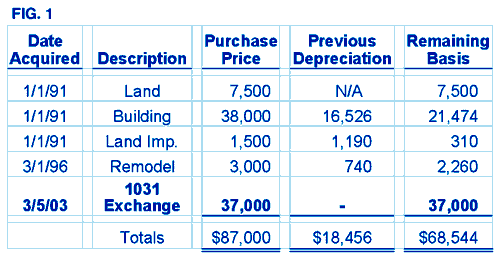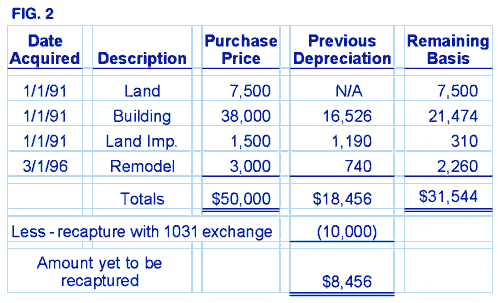You are here
1031 News › Handling Depreciation in a 1031 Exchange › Handling Depreciation in a 1031 ExchangeHandling Depreciation in a 1031 Exchange
Error message
Deprecated function: The each() function is deprecated. This message will be suppressed on further calls in _taxonomy_menu_trails_menu_breadcrumb_alter() (line 436 of /home/expert1031/public_html/sites/all/modules/taxonomy_menu_trails/taxonomy_menu_trails.inc).It’s tax time again, which means we'll be getting lots of good questions about 1031 Exchanges and tax returns. Easily one of the most common questions we get is how to handle depreciation on the New Property in an exchange.
"Depreciation" is a term for the tax benefit that allows you to recover the cost of a property over a predetermined life. Land is not depreciable, but improvements to it, like buildings, are. If you are not already depreciating your property, you can find great information about it at the IRS website at irs.ustreas.gov/prod/forms_pubs. Publication 946 is particularly good. This article, then, is for taxpayers who are depreciating their Old Property which they've sold, and have acquired a New Property through a 1031 Exchange.
The basic concept of a 1031 exchange is that the basis of your Old Property rolls over to your New Property. In other words, if you sold your Old Property for $100,000, and bought your New Property for the same, your basis on the New Property would be the same. It makes sense then that your depreciation schedule would be exactly the same, which it is! In other words, you continue your depreciation calculations as if you still own the Old Property (your acquisition date, cost, previous depreciation taken, and remaining un-depreciated basis remain the same).
If you "bought-up" in your exchange (your New Property cost more than you sold your Old for), the answer is easy – you treat the buy up part as you would a new addition to an existing property. In other words, you treat the amount of the buy-up the same as you would the cost of construction, for example, of a garage added to an existing house – the cost is the amount of the buy-up; the date you start depreciating it is the date you purchased the new property; and the depreciation method you use is the method most appropriate for that type of property in the year you bought the New Property (regardless of the method you used for the original house). If you think of it this way, then it's easy, even if your property is a large office building or a more complex purchase.
Thinking of depreciation this way makes it easy, even if it's complicated.
To give you an example, lets assume that you bought a rental house in 1990, and remodeled it in 1995. Your total investment is $50,000. In 2003 you did an exchange and you bought-up by $37,000. Your depreciation schedule that you will use to calculate depreciation for your 2003 tax return will look something like this:
fig021804_1.gif

So what happens if you buy-down (you pay less for your New Property than you sold your Old Property for)? From a depreciation calculation stand point, your basis of the New Property will be the same as that of your Old Property because the basis rolls over from the Old to the New. In other words, you will continue your depreciation schedule as if you still owned the Old Property with one small exception – you need to keep track of your depreciation recapture.
Let's say you sold your Old Property for $100,000 and you bought the new property for $90,000 – so you bought down by $10,000. This $10,000 is taxable and since you have taken almost $18,500 in depreciation, you must pay back (or "recapture") this depreciation. You'll pay tax on it in your 2003 tax return.
You need to keep track of the fact that you paid tax on this amount for the future so that you don't end up paying tax again. To do this you need to adjust your records so they look similar to the following in FIG 2.
fig021804_2.gif

One last thing to note and that is the allocation between land and improvements. You may need to adjust this allocation in some situations. For example, if you go from a large piece of land with a small building, to a small piece of land with a large building, the value of the land may actually be less, and it may be appropriate to reduce the land value and increase the depreciable building value accordingly. If you go from property with land to a rental condo which has no land, you definitely want to reallocate. Talk to a CPA about this if you need help.





Add new comment